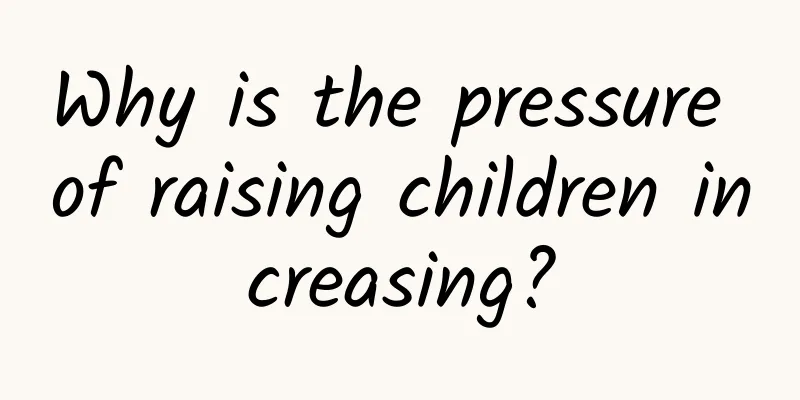Why is the pressure of raising children increasing?

|
Leviathan Press: The nuclear family model of raising children by two parents (perhaps with a nanny) seems to be the norm, but from the perspective of human evolution, this concept has only been formed for a hundred years. However, it seems impossible to return from this fragile family structure to the original extended family - the external social environment and the functional division of family members have undergone profound changes. We live in an era that increasingly emphasizes the role of the individual. Its positive value is unquestionable, but its negative effects are also slowly emerging: increasingly weak family ties and interpersonal alienation have caused the generation that grew up in nuclear families to feel stressed out in raising children. I snatched the remote from my children and settled on the sofa, preparing myself for what was to come. It was March 2020, and cases of a dangerous new coronavirus were increasing rapidly in the UK. Our Prime Minister was about to announce a lockdown. Schools and nurseries were about to close. Like millions of other parents, I was about to become, in effect, a school teacher for my young children. The thought filled me with dread. I’m not the only one who feels this way. My phone is buzzing with messages on the school’s WhatsApp group from parents who want to know how they can get their daily work done while juggling prepositions and long division. In the months that followed, many parents felt their physical and mental health took a devastating toll. As rounds of lockdowns and school closures followed, there were reports of worrying increases in parental levels of stress, anxiety and depression. Many people ask themselves, why is this so difficult? Aren’t we supposed to be naturally good at raising our own children without outside help? After all, didn’t people get by in the past without schools and nurseries? As an evolutionary biologist, I don’t have the answers to every pandemic-related family crisis, but I can say with certainty that as a species, humans are woefully inadequate at parenting in isolation. From an evolutionary perspective, it’s not surprising that many of us feel so overwhelmed. Despite the popular perception that modern family life consists of small, independent units, the fact is that we often benefit from the help of others when raising our offspring. For most of human history, this help was provided by multigenerational “extended families.” In contemporary industrialized societies, where nuclear family units are common, teachers, nannies, and other caregivers allow us to replicate this ancient support network. This way of raising children together makes us unique among apes. It’s called cooperative breeding, and it’s more similar to the way some seemingly more distant species live, like meerkats, or even ants and bees — and it gave us a crucial evolutionary advantage. Cooperatively breeding species live in large family groups where individuals work together to raise their offspring. Perhaps surprisingly, other apes—like chimpanzees—don’t raise their offspring this way. Although both humans and chimpanzees live in complex communities made up of both kin and non-kin, a closer look reveals some striking differences. Chimpanzee mothers raise their young on their own, with little or no help from outside sources, not even the fathers. The same is true for gorillas, orangutans, and bonobos. (link.springer.com/referenceworkentry/10.1007%2F978-3-319-47829-6_1351-1) (www.ncbi.nlm.nih.gov/pmc/articles/PMC3826206/) What's more, female apes don't go through physiological menopause, meaning they can reproduce throughout their lives. As a result, it's common for a mother and a daughter to raise their own offspring at the same time. This limits the possibility of ape grandmothers helping to raise their grandchildren. (www.pnas.org/content/105/14/5332) As a species, humans are woefully inadequate at raising children in isolation. We are clearly different. For most of our history on Earth, we have lived in large families, with mothers receiving help from many other family members. This is still the case in many contemporary human societies. Human fathers are often involved in raising their offspring, although the extent of fathers’ involvement varies from society to society. Infants also receive input from a variety of other relatives, including older siblings, aunts and uncles, cousins, and, of course, grandparents. Even small children can play an important role in raising and protecting younger children. In these cases, the responsibility for caring for a child rarely falls on just one person. (onlinelibrary.wiley.com/doi/abs/10.1002/evan.21382) Abbey Page, a biological anthropologist who has worked extensively with the Agta, a hunter-gatherer group in the Philippines, says we are only just beginning to understand the full scope of these traditional support networks. Among the Agta, for example, children as young as four are often productive members of the family. “Children’s contributions are often overlooked,” Page said. In the past, because of strict definitions of work and play, researchers often didn’t notice that a child might be playing at one moment and picking fruit from the bush the next. “[In hunter-gatherer societies like these], children are definitely providing for themselves,” she said. Aeta children also protect their younger siblings from danger. Page recounts a time when she was sitting in an Aeta hut with a four-year-old boy and his infant sister. All three of them were sitting on the floor when a scorpion crawled in. Page confessed that she panicked: “I couldn’t do anything to help.” Fortunately, the young boy knew what to do: “He immediately jumped up, pulled a stick from the fire, hit the scorpion, and then jumped and stamped on it.” This simple action likely saved his sister’s life. (socialsciences.nature.com/posts/51985-when-is-childcare-really-childcare) This experience prompted Page to think about what constitutes meaningful childcare. In the West, childcare usually means that a responsible adult (usually a parent) not only takes care of a young child, but also provides a lot of stimulation and is deeply involved in the child's life. When parents are unable to do this due to busy work or other reasons, they may feel guilty or inadequate. But Page's research reveals that there are many other ways to care for children and help them thrive, without putting all the burden on parents. In fact, sibling care, where older offspring help raise younger siblings, is a defining feature of species that reproduce together. Meerkats look for food to share with their young and care for their pups in burrows. They teach them how to safely handle dangerous prey. Female meerkats even produce milk to feed their younger siblings. Like the child who saved his sister from a scorpion, some of the most important forms of care in these cooperatives involve protecting the young: keeping them from predators and keeping them out of trouble. Cooperative breeding has a key advantage over raising offspring individually: it can make a species more adaptable and may evolve as a means of resisting adversity. Many cooperatively breeding species are found in the hottest, driest regions of the planet. Early humans also lived in harsh areas where food was hard to find, either by gathering, foraging or hunting. For humans, cooperation was a prerequisite for survival, but it was not the case for our great ape contemporaries. Our ape cousins all lived in relatively stable, benign environments—basically, giant salad bowls—where they had easy access to the food they needed to feed themselves and any offspring who depended on them. (royalsocietypublishing.org/doi/full/10.1098/rsos.160897) It turns out that humans are the only apes capable of surviving in such a difficult environment: no great apes are found in the fossil record in these areas. Paradoxically, the same tendencies in our cooperation that have allowed us to survive and thrive for so long may make the current crisis more difficult, both from a psychological and practical perspective. During lockdown, we have been cut off from our support networks: grandparents, aunts and uncles, as well as the schools, nurseries and playgroups that helped to mimic ancient human group structures. Not only that, we have been expected to return to our nuclear family units, as if this should be an instinctive behavior. For many of us, this is almost impossible to explain, and there is no real way to understand why we feel this way. After all, our Western concept of the family places too much emphasis on mother care and too little on the contributions of other family members. The expectation is that mother and father—or even just mother alone—are sufficient caregivers. However, according to Rebecca Sear, professor of evolutionary demography at the London School of Hygiene and Tropical Medicine, this idea of a self-sufficient nuclear family reflects the experience and worldview of Western researchers rather than historical reality. The idea of the nuclear family with a male breadwinner was particularly entrenched in the post-World War II period, Mr Searle said, because “academia was filled with wealthy, white, Western men who looked around at their own families and assumed that the world had always been that way”. (royalsocietypublishing.org/doi/abs/10.1098/rstb.2020.0020) The term "nuclear family" did not appear until the 1920s, but the family structure it refers to, which is centered around two parents and relatively few children, appeared earlier and may be related to the first Industrial Revolution, as the shift from agriculture to manufacturing enabled people to enjoy a more independent lifestyle. Another explanation is that medieval Western church policies prohibited marriage between close and distant relatives within extended families, resulting in smaller family units. But while the "nuclear family" is a ubiquitous concept in 20th-century Western studies and popular culture, appearing in countless novels, films, and television shows, Seale explains that even in the West it is actually quite anomalous. “Globally, it’s relatively rare for just parents and children to live together,” Mr Searle said. “Family structures vary around the world, but it’s pretty common for parents to get help raising their children, even in the middle class in the West.” She explains that for humans, the typical family structure is not one in which a single couple raises children. Instead, we often need and do accept help in raising children. Nor is the idea of women as mothers and homemakers as traditional as they are sometimes promoted. Historically and in contemporary survivalist societies, women play an important role in household production: they are also breadwinners. With this different perspective on the human family, perhaps our expectations for parenting during the COVID-19 pandemic will differ. Rather than assuming that parents—especially mothers—should (and will) bear the burden, perhaps we should acknowledge the critical role of other family members and caregivers. Once we understand how much humans rely on each other to raise our offspring, we may be more tolerant of others and ourselves as we struggle with raising children. Expecting humans to raise their offspring like chimpanzees is a bit like isolating an ant from her colony: We are not necessarily suited to that lifestyle—and often have a hard time adapting to it. Acknowledging that we need others is not a sign of failure; it’s what makes us human. By Nichola Raihani Translated by Kushan Proofreading/Sesame filling teeth gap Original article/www.bbc.com/future/article/20211102-stressed-by-parenting-evolution-explains-why This article is based on the Creative Commons License (BY-NC) and is published by Kushan on Leviathan The article only reflects the author's views and does not necessarily represent the position of Leviathan |
<<: Why does eating dumplings raise blood sugar so quickly? Six ways to eat dumplings safely
Recommend
What is it like to "catch dolls" on the moon and "speed cars" on Mars? They can tell you the answer
What is it like to "catch dolls" 380,00...
Latest research: It is expected to "crush" cancer-causing viruses in the cradle and "upgrade the navigation" of the immune system
The human body contains about 500 lymph nodes, an...
World Thrombosis Day丨What bad living habits are the "black hands" behind thrombosis?
Author: Liu Xinming, attending physician, Beijing...
Audi announced that the e-tron will be produced in China next year, with a production capacity of about 45,000 to 50,000 units
Previously, Audi officially launched its first pu...
LeTV TV's ecological operation breaks the traditional price thinking
Yesterday, 60,000 LeTV TV Super TVs S40 Air and S...
iFlytek: The dream of a market value of 100 billion yuan is shattered? Relying on government subsidies to increase profits
Artificial intelligence has been popular all over...
How to develop a suitable user growth strategy?
Before doing user growth , it is very important t...
Diagnosed with "rhabdomyolysis" due to the wrong use of this "massage magic tool"? !
Friends who love fitness You must be familiar wit...
Menopause occurs in both men and women? How to adjust your diet? What should you pay attention to in your life? Huaxi doctors say...
As the saying goes "When you reach middle ag...
How to run an event and attract new customers in 2 days?
1. Case Background As a rule, before talking abou...
2019 Kuaishou operation tips for increasing followers!
The predecessor of Kuaishou, called "GIF Kua...
How to plan a hit event?
With the fading of traffic dividends in recent ye...
What happened to all kindergartens in Dalian being suspended? What is the specific situation?
What happened to all kindergartens in Dalian bein...
By 2020, perhaps screen fingerprint and face recognition will coexist on the iPhone
In a few days we will welcome the new iPhone seri...
【Maomao】28-day short-term hot money training camp-comprehensive class
[Maomao] 28-day short-term hot money training cam...

![[Smart Farmers] The Wandering Earth from an Agricultural Perspective: Having Survived Several Extinction Events, This “Living Fossil Fish” May Become Hope for Doomsday](/upload/images/67f246011d7e6.webp)







